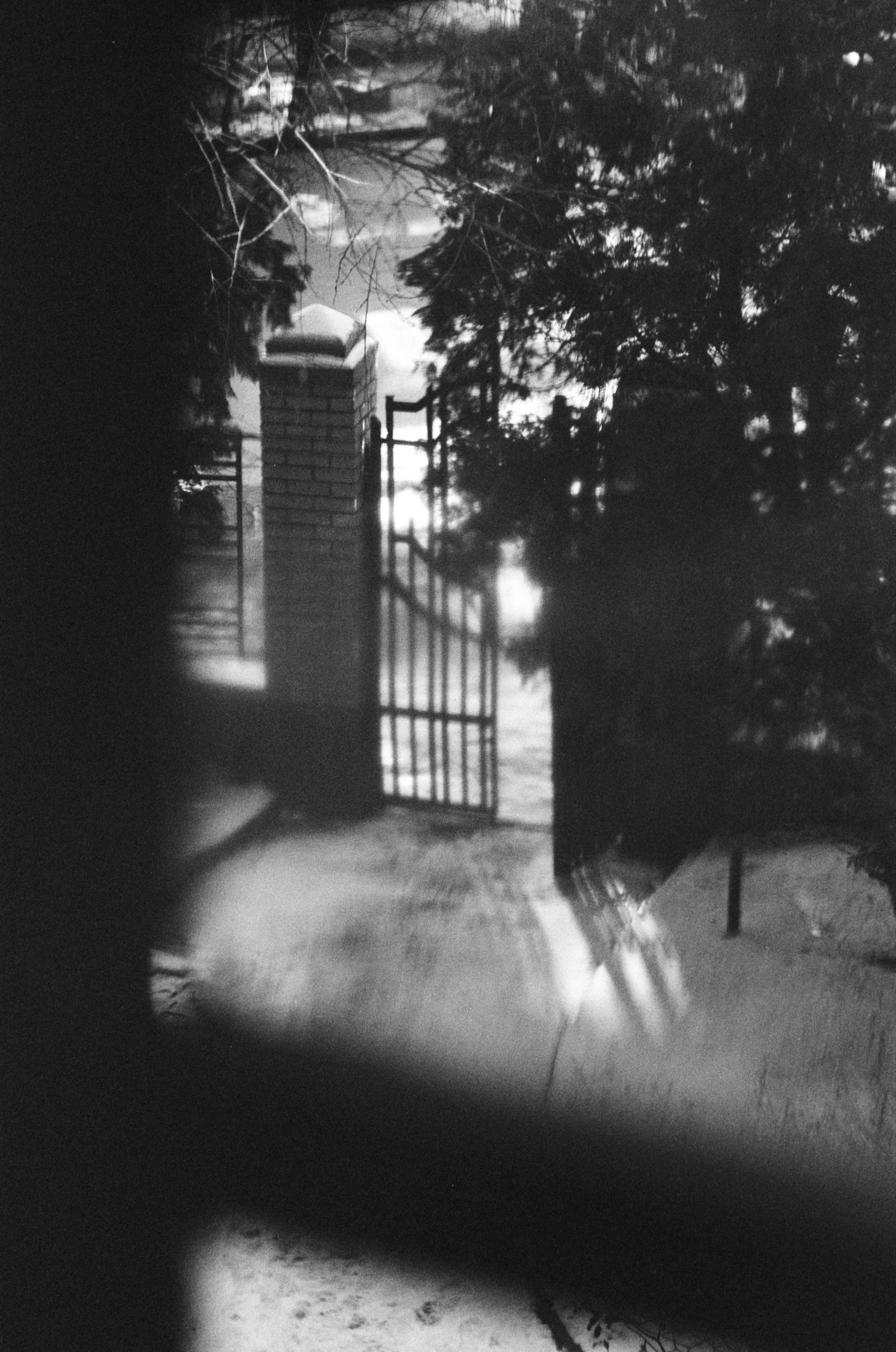Dr. Vasyl
“There aren’t really any other buildings with their own name around here,” a photographer from Kyiv told me few days ago, seing me surprised upon his enthousiastic reaction when I told him where I lived. The Doctor's House is a constructivist building built between 1928 and 1930 by architect Pavlo Alioshin (1881-1961) at 17/2 Velika Zhitomirska Street, in the Golden Gate district of Kyiv. Alioshin moved in immediately and lived there until his death. It's a four-story brick building, situated on a street corner, with a layout divided into sections (there are several entrances, and, as far as I know, the sections do not connect internally). The lateral parts are straight, while the central part – its most charming feature – is rounded, with each apartment featuring balconies and loggias overlooking a small ornamental garden. Its somewhat dilapidated condition hides the remarkable quality of the building. Moreover, since its construction, 8-9 story buildings have sprung up nearby, making its architectural impact less obvious. Apparently, the roof was originally designed to be a solarium accessible to residents, some of whom were prominent Kyiv figures. Today, access to the roof is closed.
Veronika and I moved in almost by chance. Last summer, we were urgently looking for a place to stay for the medium to long term when a friend now living abroad wrote to us that the apartment was available, but that there were some conditions for living there. The apartment had seemingly remained unchanged since our friend’s father, a theater and film director born there, moved into a more modern building. The spacious four rooms are filled with furniture from another era and an impressive collection of Soviet books, mostly in Russian. The walls are covered with peeling wallpaper, giving the place a perfectly preserved 1980s Perestroika ambiance, ideal for a film set with little need for alteration. Temporary residents, we cannot touch anything, and in exchange for living in this remarkable and historic building in Kyiv, we must live surrounded by other’s memories. Remarkably in wartime Kyiv, gas and electricity are almost never cut, even when the power grid is strained by Russian bombings. The proximity of embassies and ministries likely plays a role. Or perhaps it’s because the outdated electrical system wouldn’t withstand frequent outages, which could cause short circuits (and potentially fires).
When we moved in, an old man was begging at the garden entrance, sprawled out beside a vodka flask hidden in a plastic bag, wearing dirty and tattered clothes, with long yellowed hair and beard. He had deep, intelligent blue eyes, with a slight twinkle that revealed an understanding of the absurdity of his situation, suggesting a less neglected past. “He lives here,” the owner of our apartment told me. “He smells bad, makes a lot of problems. He’s been like this since his wife died.” I quickly realized that he was actually our upstairs neighbor.
One evening, returning just before curfew (midnight), he was dozing outside in the autumn chill. When he saw us entering, he asked us to hold the door open for him before dragging himself, on three limbs, into the hallway. I noticed that he right feet was three time bigger than the other. He must have waited until we were home before, shamefully for him, climbing the two flights of stairs to his apartment.
One day, in an adjacent street, a man in his early sixties showed interest in my camera. “I was a photographer too,” he told me in Russian. “I had a Nikon, almost like yours... Do you live here? I had a friend there... but he’s just a shadow of himself now. His wife died after a night of heavy drinking, sometime after the war started, in 2022 or 2023. He didn’t tell anyone and lived with her corpse for several days. Since then, he’s been drinking heavily. He was a physicist before that, worked at a well-known research center.”
The "drunkard of the building" quickly became someone to me, a story, a drama. A few weeks later, we took the opportunity to open the door for him and have a chat. “Thank you... you’re kind... people in the building haven’t liked me much since my wife died... a terrible story... my name is Vasil... do you work in culture? I was a scientist, a physicist... but I knew the cultural world well... I often went to the theater... I even knew directors and actors... but since my wife died... I’ve been wandering... my leg is dead... I kicked my wife’s grave at her funeral... never treated it..." I asked him why he always waited for someone to open the door, and if it wouldn’t be easier if I made him a copy of the key. “Oh, really? You’d do that for me?”
The next day, I brought him a duplicate of the building's entrance key, not quite understanding how he would manage to reach the lock with his gangrenous leg. He looked at me thanksfully, making his eyes smile. A few days later, an elderly woman who introduced herself as Vasily's late wife's mother told Veronika that he had been admitted to the hospital. She was there to sort out his apartment and planned to have some minor repairs done.
We never saw him again. He died last winter, perhaps from gangrene, perhaps from alcohol. He had abandoned any physical desire to live but had never let go of his smile, those beautiful blue eyes, and the gentle tone of his voice. He must have been about 60 but looked 80. I doubt he will be remembered in the history of the Doctor's House at 17/2 Velika Zhitomirska Street. Even though I didn’t really know him, every time I pass through the little archway that separates the garden from the street, the very spot where he used to sprawl, I think of him.
